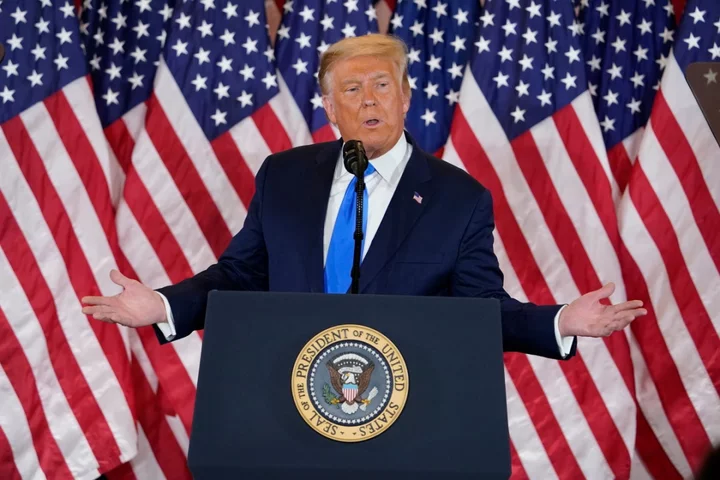
Read Donald Trump’s new superseding indictment in classified documents case in full
Donald Trump was hit with a new set of federal charges on Thursday related to his alleged mishandling of classified documents since leaving the White House in January 2021. Mr Trump and his aide Walt Nauta had already been charged in Justice Department special counsel Jack Smith’s investigation into the retention of government documents at the former president’s Mar-a-Lago home in Palm Beach, Florida. Now, the new superseding indictment brings fresh charges against the two men and also makes a formal allegation against a third man – Mar-a-Lago property manager Carlos De Oliveira. Prosecutors have accused the three men of plotting to deleting security footage from Mar-a-Lago in order to conceal potential evidence of misconduct. The fresh charges come at a time when Mr Smith is also pursuing another probe into Mr Trump over his efforts to overturn the result of the 2020 presidential election and his role in the Capitol riot of 6 January 2021. Here you can read the superseding indictment in the classified documents case in full: Read More Trump news – live: Trump hit with new charges in classified documents case as Mar-a-Lago aide indicted Trump hit with more charges as Mar-a-Lago worker added to documents case Carlos De Oliveira: Who is second Trump aide now charged in Mar-a-Lago secret documents case Is Donald Trump going to prison?
2023-07-28 17:53
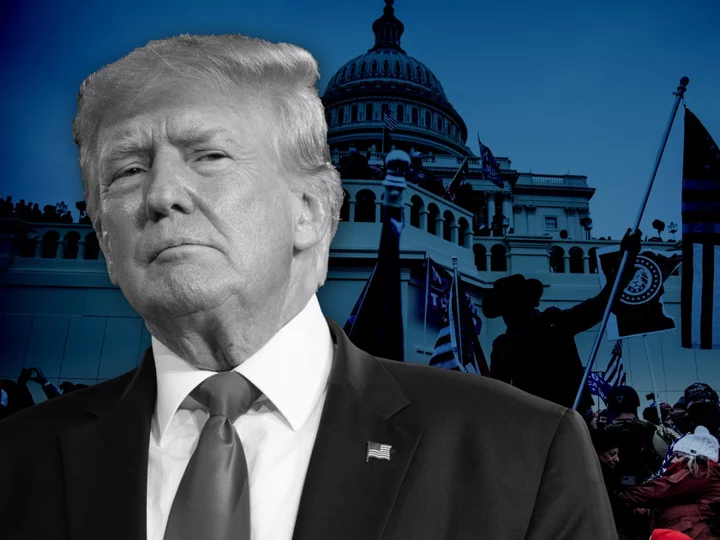
Trump’s election fraud claims were always bogus. Will his history of lies finally catch up to him?
Former president Donald Trump’s attempts to undermine the results of elections that his rivals have won are now at the centre of a sprawling federal investigation, one that follows an avalanche of lies and conspiracy theories about the democratic process and a campaign to overturn the votes of millions of Americans. Lawsuits from his legal team and Trump allies were shot down in court. His own administration and campaign failed to produce any evidence. But his false and inflated claims, spanning more than a decade, have sowed enough doubt among his supporters to construct the lie of “stolen” and “rigged” elections, animating Republican attempts to challenge results and craft legislation to do what Mr Trump failed to do in the courts. A persistent lie that the election was stolen from him fuelled violence at the US Capitol on 6 January, 2021, sustained partisan investigations intended to reverse the outcomes in states he lost, inspired Republican-led legislation in nearly every state to change how elections are run, and has formed the basis of Mr Trump’s 2024 campaign. Did he believe the “truth” of his claims? And how often was he told, by both his advisers and White House officials, that he was wrong? These are questions that prosecutors are likely considering as US Department of Justice special counsel Jack Smith and his team weigh another federal indictment against the former president, but they won’t need to establish that he was aware that he was spreading misinformation to charge him for a range of potential election-related crimes. Years of evidence, however, suggests that he knew what he was saying was false, or that he should have known he was not telling the truth, when he waged his assault on an election he lost to Joe Biden. A history of ‘sham’ and ‘rigged’ elections He told his followers to “march on Washington and stop this travesty.” He told them to “fight like hell and stop this great and disgusting injustice”. “The world is laughing at us,” he said. “This election is a total sham and a travesty. We are not a democracy! Our country is now in serious and unprecedented trouble ... like never before.” It was 7 November, 2012, and Barack Obama’s election night defeat of Mitt Romney sent Donald Trump into a Twitter tailspin. Most of those messages were later deleted, but similar statements were repeated often and in public in the years that followed, including on a stage in Washington DC that day a mob of his followers stormed the halls of Congress on 6 January, 2021. Four years after raging over 2012 results, after he came in second place in the Iowa caucus for the Republican nomination for president, Mr Trump said his then-rival Ted Cruz “stole” the primary from him. “Ted Cruz didn’t win Iowa, he stole it. That is why all of the polls were so wrong and why he got far more votes than anticipated. Bad!” he said on Twitter in February 2016. He called for a new election or for the votes to be “nullified”. In August 2016, during a campaign stop in Ohio, he said he is “afraid the election’s going to be rigged” – a statement based on nothing. But that summer, however, Republican operative Roger Stone called on then-candidate Trump to talk about voter fraud “constantly”. He told Breitbart: “He needs to say for example, today would be a perfect example: ‘I am leading in Florida. The polls all show it. If I lose Florida, we will know that there’s voter fraud. If there’s voter fraud, this election will be illegitimate, the election of the winner will be illegitimate, we will have a constitutional crisis, widespread civil disobedience, and the government will no longer be the government.’” Mr Trump “will go to the places other politicians won’t, and he’s probably the only person to run for president within the last 50 years who would dare to do this, and might even get away with it,” Stone added. Then-candidate Trump would later tell Fox News host Sean Hannity that there are “1.8 million people who are dead, who are registered to vote, and some of them absolutely vote.” “Of course there is large-scale voter fraud happening on and before election day. Why do Republican leaders deny what is going on? So naive!” he said on Twitter that same week. A voter fraud commission that found no evidence of voter fraud Shortly after entering office in 2017, Mr Trump established a Presidential Advisory Commission on Election Integrity, chaired by his then-Vice President Mike Pence. Kris Kobach, then the secretary of state of Kansas and a key architect of GOP election laws, was appointed as vice chair. Other members of the commission included members of influential right-wing think tanks like the Heritage Foundation and the Public Interest Legal Foundation, which have also advanced restrictive voting laws under the “election integrity” banner. In July 2017, Mr Kobach requested every state to provide a list of all registered voters, the last four digits of their Social Security numbers, their addresses, dates of birth, political affiliation, and voting history. Mississippi’s Secretary of State Delbert Hosemann said the commission’s request “can go jump in the Gulf of Mexico”. Virginia’s then-Governor Terry McAuliffe said he had “no intention” to respond to the commission’s request. “This entire commission is based on the specious and false notion that there was widespread voter fraud last November. At best this commission was set up as a pretext to validate Donald Trump’s alternative election facts, and at worst is a tool to commit large-scale voter suppression,” he said in a statement at the time. He added that the only “irregularity” stemming from the 2016 presidential election involved Russian troll farms to sow political and social discord and boost Mr Trump’s candidacy. On 3 January, 2018, Mr Trump announced that he was dissolving the commission. “Despite substantial evidence of voter fraud, many states have refused to provide the Presidential Advisory Commission on Election Integrity with basic information relevant to its inquiry,” he said in a statement at the time. “Rather than engage in endless legal battles at taxpayer expense, today I signed an executive order to dissolve the Commission, and have asked the Department of Homeland Security to review these issues and determine next courses of action.” The commission released its documents six months later, after a lawsuit from Maine’s secretary of State and commission member Matthew Dunlap argued that instead of “widespread evidence of fraud” the commission’s findings “actually reveals a troubling bias.” Mr Dunlap said that the commission’s “purpose was not to pursue the truth but rather to provide an official imprimatur of legitimacy [from] President Trump’s assertions that millions of illegal votes were cast during the 2016 election and to pave the way for policy changes designed to undermine the right to vote.” There exists “no single document that reveals there is no widespread voter fraud,” according to Mr Dunlap, but evidence that fails to substantiate the president’s claims. A disinformation campaign before a single vote was cast Before he publicly and repeatedly cast doubt on the legitimacy of mail-in ballots and the results of the 2020 election, then-President Trump was reportedly so impressed with his administration’s work in election security that he planned a press conference around it. Months before Election Day, intelligence officials met with Mr Trump and other White House officials on 14 February, 2020 to review potential threats to that year’s election and assured the president they had no concerns about its integrity. That briefing came one day after a House committee hearing with intelligence officials who warned lawmakers that Russia was likely interfering in 2020 campaigns to boost Mr Trump’s chances of re-election. Days later, Mr Trump fired Joseph Maguire, the acting director of national intelligence who testified at that hearing. He was immediately replaced with Richard Grenell. That press conference never happened; Mr Trump continued his narrative that elections, particularly those in which Republicans lose, are corrupt. In March 2020, as election officials prepared for an increase in voting by mail during the onset of the Covid-19 pandemic, Mr Trump told Fox News that higher voter turnout would be a political disaster for Republicans. “The things they had in there were crazy,” he said of Democratic proposals for emergency coronavirus aid. “They had levels of voting, that if you ever agreed to it you’d never have a Republican elected in this country again.” Mr Trump vowed to block such emergency funding for the US Postal Service, specifically to prevent expanded access to voting by mail. “They need that money in order to make the Post Office work so it can take all of these millions and millions of ballots,” he told Fox Business in August 2020. “But if they don’t get those two items, that means you can’t have universal mail-in voting, because they’re not equipped to have it.” Mr Trump and Republicans have repeatedly claimed without evidence that “universal mail-in voting” – in which any eligible voter can request an absentee ballot – is ripe for fraud. “Republicans should fight very hard when it comes to state wide mail-in voting. Democrats are clamoring for it,” Mr Trump said in April 2020. “Tremendous potential for voter fraud, and for whatever reason, doesn’t work out well for Republicans.” Proponents have often defended those claims by pointing to a 2005 report from the Commission on Federal Election Reform, co-chaired by former President Jimmy Carter and former Secretary of State James A Baker III. The report noted that because voting by mail takes place outside of polling locations, there is an increased potential for fraud, but does not say that any such fraud has occurred on the scale Mr Trump has alleged. The report goes on to state that when safeguards are in place – like in Oregon, where voters have exclusively voted by mail since 1998 – fraud was virtually nonexistent. False claims and mischaracterisations about the report prompted former President Carter to issue a rare public statement in May 2020 urging political leaders “to take immediate steps to expand vote-by-mail and other measures that can help protect the core of American democracy – the right of our citizens to vote.” After court rulings struck down his attempts to challenge vote-by-mail policies, and as he campaign failed to find evidence, then-President Trump routinely used his bully pulpit at the White House and on stage at his campaign rallies to launch a flood of false claims spread widely among his supporters and on social media. When a federal judge ordered his campaign to “produce such evidence in their possession, and if they have none, state as much,” attorneys produced evidence pointing to only a handful of election fraud cases – none of which involved mail-in ballots. A legal effort to overturn results while aides told him he lost By Election Day in 2020, then-President Trump made dozens of false or misleading statements about voter fraud and voting by mail within that year alone. He kept going within hours after polls closed on 3 November. “A big WIN!” he wrote on Twitter at 12.45am that night. “We are up BIG, but they are trying to STEAL the Election. We will never let them do it. Votes cannot be cast after the Polls are closed!” he wrote minutes later. At a news conference hours later, he claimed a “very sad group of people” are “trying to disenfranchise” his supporters before listing states that he falsely claimed to have won. “Frankly, we did win this election,” he said. “So our goal now is to ensure the integrity, for the good of this nation. This is a very big moment. This is a major fraud on our nation.” Over the following days and months, he continued to suggest that the late-counted mail-in ballots for Mr Biden that changed the outcome in states that he lost were evidence of fraud, after he spent months denigrating absentee ballots and urging his supporters to cast their votes in person. A flurry of legal challenges and partisan legislative hearings targeted election laws and outcomes in states that he lost; none produced any evidence of widespread fraud. His legal team largely walked away from the effort, except for Sidney Powell and Rudy Giuliani, who are now facing defamation claims and professional sanctions for amplifying the same baseless claims. In November 2020, one week after the election, Mr Krebs said in a statement through his agency that “there is no evidence that any voting system deleted or lost votes, changed votes, or was in any way compromised.” That sentence was highlighted in bold in the statement. Mr Trump fired him with a tweet. The House select committee investigating the events surrounding January 6 found that Mr Trump’s senior advisers told him on 12 November, 2020, that he lost the election – not from fraud, but because more people voted for Mr Biden. Mr Trump was then reportedly furious with his Attorney General Bill Barr when he told the Associated Press in December 2020 that “to date” no agency has seen any evidence of fraud “on a scale that could have affected a different outcome in the election.” That month, John Eastman – a Trump-linked attorney who organised the so-called “alternate” elector scheme – also warned the campaign against repeating debunked data in a suit targeting Georgia’s election results. Mr Trump was “made aware that some of the allegations (and evidence proffered by the experts) has been inaccurate,” Mr Eastman wrote, according to court filings. “For him to sign a new verification with that knowledge (and incorporation by reference) would not be accurate.” That email from Mr Eastman underscores what federal prosecutors are likely now examining: That Mr Trump’s team was aware that the arguments they were making were indefensible, and that the man who was insisting on them knew that. Judge Carter also pointed to an email from a Trump attorney that said “merely having this case pending in the Supreme Court, not ruled on, might be enough to delay consideration of Georgia.” “This email, read in context with other documents in this review, make clear that President Trump filed certain lawsuits not to obtain legal relief, but to disrupt or delay the January 6 congressional proceedings through the courts,” wrote Mr Carter, alleging a similar tactic that Mr Trump has used to squash investigations and lawsuits against him for years. The House committee spent a year and a half on its investigation, including a series of blockbuster public hearings laying out evidence and witness testimony describing the depth of Mr Trump’s attempts to remain in office at whatever cost. The panel’s final 845-page report provides a detailed account of Mr Trump’s refusal to cede power – regardless of the outcome of a democratic election – while his close advisers told him that he lost. In his interview with the House select committee, Trump adviser Jason Miller said he had “several” conversations with Mr Trump that his claims were wrong. Mr Barr told the committee that Mr Trump’s claims were “detached from reality”. Mr Barr and other administration officials also said they tried to debunk conspiracy theories surrounding Dominion Voting Systems, which recently settled with Fox News for $787m in a landmark defamation case against the network. But Mr Trump went on to tweet about Dominion nearly three dozen times from November 2020 up until the attack on the Capitol on January 6. In a text message reviewed by federal prosecutors, Mr Trump’s own chief of staff Mark Meadows joked with a White House lawyer about his false claims of voter fraud in Georgia. The former president has continued a narrative of political persecution as he seeks the 2024 Republican nomination for president, with a reliable mention of “stolen” or “rigged” election in speeches and on his Truth Social platform. Mr Trump, who has reliably turned to projection in his rhetorical playbook, is now referring to the multiple investigations and indictments against him as their own form of politically motivated “election interference” to stop him from reaching the White House. Read More Trump news – live: Trump and aides charged with plotting to delete security footage in classified docs case All the lawsuits and criminal charges involving Trump and where they stand Is Donald Trump going to prison? Biden will sign an executive order in Maine encouraging new inventions to be made in the US All the investigations Trump still faces following his second arrest What charges does Donald Trump face in the classified documents case?
2023-07-28 17:46

No clarity about who's in charge in Niger, 2 days after mutinous soldiers ousted the president
Two days after mutinous soldiers ousted Niger’s democratically elected president, it was still unclear Friday morning who was running the country and what mediation efforts were underway, as analysts warned that political chaos could set back the fight on extremist groups and increase Russia's influence in the region. On Thursday, several hundred people gathered in the capital, Niamey, and chanted support for the Russian private military group Wagner while waving Russian flags. Later, they burned cars and ransacked the headquarters of the president's political party. “We’re fed up,” said Omar Issaka, one of the protestors. “We are tired of being targeted by the men in the bush ... Down with the French people. We’re going to collaborate with Russia now,” he said. The soldiers have not announced a leader and President Mohamed Bazoum, who was elected two years ago in Niger’s first peaceful, democratic transfer of power since its independence from France in 1960, has not resigned. Some of the last public communications from the government included a defiant tweet by the president Thursday declaring that democracy would prevail and a call by the Foreign Minister Hassoumi Massoudou, on media outlet France 24, for Nigeriens to stand against the mutiny. Someone close to the president who is not authorized to speak about the situation, told The Associated Press that Bazoum has no intention of resigning and talks were ongoing. However, it's unclear who's involved in these dialogues, the nature of the discussions or how they're proceeding. Analysts say the coup could destabilize the country and threatens to starkly reshape the international community’s engagement with the Sahel region. Bazoum is a key ally in the West’s efforts to battle the jihadists, and the West African nation has been seen as the last major Western partner standing against extremism in a region where anti-French sentiment has paved the way for the Russian private military group Wagner. Neighboring Mali and Burkina Faso have both ousted the French military, which previously provided aid in their fight against jihadists. Mali has contracted Wagner, and it’s believed the mercenaries will soon be in Burkina Faso. Earlier this week, The Economic Community of West African States said it was sending Benin President Patrice Talon to lead mediation efforts, but as of Friday Talon was not in the country. During their first address to the nation Wednesday night, the mutineers urged “external partners” not to interfere. French Foreign Minister Catherine Colonna told French media Friday that President Emmanuel Macron has spoken several times to Bazoum. Colonna said France believes there are still possible exits from the crisis, and that Paris regards the attempted coup as lacking any legitimacy. On Thursday, U.S. Vice President Kamala Harris, said the country's “substantial cooperation with the Government of Niger is contingent on Niger’s continued commitment to democratic standards". Niger could lose millions of dollars in military aid and assistance, which the United States and European countries have recently poured in an attempt to help in the fight against Islamic extremism. The United States in early 2021 said it had provided Niger with more than $500 million in military assistance and training programs since 2012, one of the largest such support programs in sub-Saharan Africa. The European Union earlier this year launched a 27 million-euro ($30 million) military training mission in Niger. The United States has more than 1,000 service personnel in the country. France has 1,500 soldiers, which conduct joint operations with the Nigeriens. The coup has dashed hopes of collaboration between Sahelian countries and Western powers, which offered a more robust response to the jihadist insurrection when compared with the strategies to arm civilians in Burkina Faso or the responsibility given to Wagner in Mali, said Ibrahim Yahaya Ibrahim, senior Sahel analyst for the International Crisis Group. As uncertainty lingers about who's in charge, insecurity could worsen. “The army officers will be busy positioning themselves in power struggles and abandon the fight against jihadists,” said Ulf Laessing, head of the Sahel program at the Konrad Adenauer Foundation. Rights groups also warn that civilians always bear the brunt of these mutinies. “During a coup, the first victims are always the same: the most vulnerable, women and children,” said Drissa Traore, secretary-general of the International Federation for Human Rights. On Thursday the United Nations Office for the Coordination of Humanitarian Affairs said it has paused operations in Niger, where more than 370,000 people are internally displaced and more than 4 million rely on aid. ___ AP writer John Leicester in Paris contributed to this report. Read More Ukraine war’s heaviest fight rages in east - follow live Charity boss speaks out over ‘traumatic’ encounter with royal aide Stock market today: Asian shares mixed, Tokyo falls as Bank of Japan adjusts bond purchase policy India and Japan look to collaborate in building semiconductors and resilient supply chains AP Week in Pictures: Europe and Africa
2023-07-28 15:47
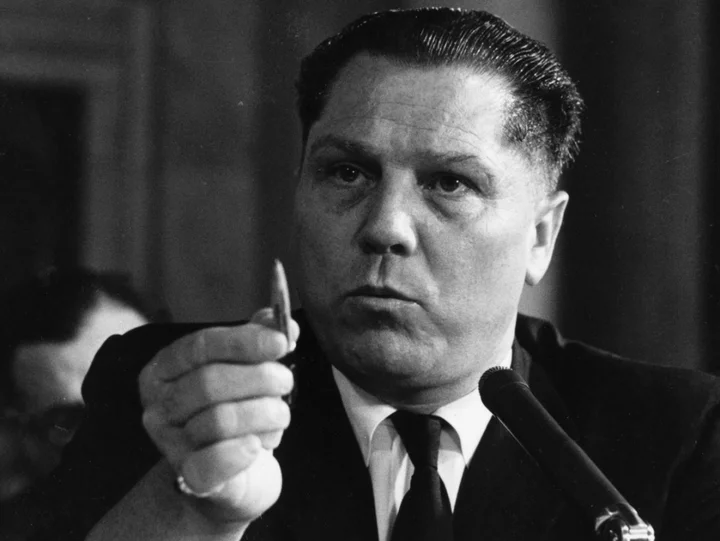
Jimmy Hoffa disappearance anniversary: What happened to long-lost union leader presumed murdered by the mob?
Jimmy Hoffa, the legendary American union organiser, disappeared from a parking lot outside of the Machus Red Fox restaurant in Bloomfield Township, Detroit, 48 years ago on Saturday 30 July 1975. Presumed dead since the same date in 1982, his body has never been found, no one has ever been charged and the case remains unsolved. Hoffa, 62, was last heard from at around 2.15pm that afternoon, calling his wife at their home in Lake Orion and a friend, Louis Linteau, at his office from a public payphone, griping that the two gentlemen he was supposed to be meeting for lunch had failed to show up. He was subsequently spotted talking to several other men nearby before being driven away in a maroon car that one eyewitness, a truck driver, told investigators could have been a Lincoln or maybe a Mercury Marquis. It might as well have been a hearse, for all the difference it made, for James Riddle Hoffa would never be seen again. His own vehicle, a green Pontiac Grand Ville, stood abandoned at the scene, just where he had left it. Long assumed to have been the victim of a mob hit, the visionary general president of the International Brotherhood of Teamsters (IBT) – who dramatically expanded the union’s reach, influence and coffers between 1957 and 1971, before being brought down by scandal – certainly had more than his fair share of powerful enemies and shady associates. Hoffa’s story – or, at least, versions of it – has frequently been told over the past half-century, often fictionalised through characters loosely based upon him in movies like Sergio Leone’s Once Upon a Time in America (1984) or more directly in Danny DeVito’s biopic Hoffa (1992) starring Jack Nicholson, James Ellroy’s Underworld USA novel sequence or Martin Scorcese’s recent The Irishman (2019) in which Al Pacino played the doomed labour leader. But none of those projects have come close to cracking one of the most enduring true crime mysteries in the history of American public life. What really happened to Jimmy Hoffa? Now that is a riddle. Born on Valentine’s Day 1913 in Brazil, Indiana, Hoffa’s Pennsylvania Dutch father John was a coal miner who passed away from lung disease in 1920 when his son was just seven years old, prompting the family to relocate to Detroit, Michigan, soon to become the epicentre of the mighty American auto industry. Realising he would need to grow up fast to support his mother, Hoffa left school at 14 to work as a stock boy for a grocery chain, where he soon took exception to the inadequate wages he received, the perilous terms of his employment and the inequality he saw all around him, which would only worsen in the aftermath of the Wall Street Crash of 1929 with the coming of the Great Depression. Having learned to stand up for himself against workplace injustice, Hoffa quit in 1932 to work as a professional organiser with the Local 299 chapter of the Teamsters union, representing Detroit’s truck drivers and warehouse operatives. As the organisation grew over the course of a combative decade, consolidating its power first locally, then regionally and finally nationally, Hoffa met the Polish girl who would become his wife, Josephine Poszywak, during a strike undertaken by non-unionised laundry workers in early 1937. They married that September. Hoffa’s growing reputation and networking smarts saw him named chairman of the Central States Drivers Council in 1940, president of the Michigan Conference of Teamsters in 1942 and then president of Local 299 by 1946, all without moving so much as a single truck himself. As a labour stalwart, Hoffa secured a draft deferment when the United States entered the Second World War by successfully arguing he would be of far greater service to his country organising industry at home than he might be deployed as a grunt abroad. That also meant he was well positioned to reap the spoils of the American economic boom of the Truman years. By 1952, he was appointed international vice president of the IBT, serving as deputy to Dave Beck, who was himself succeeding Daniel Tobin, who had led the union since way back in 1907. The IBT relocated its headquarters from Indianapolis to Washington, DC, three years later in order to be better placed to lobby Congress for its interests. It had never been more powerful. Then, in 1957, Beck was indicted, convicted and jailed on fraud charges after being hauled before John McClellan’s Senate Select Committee on Improper Activities in the Labour or Management Field. Hoffa was voted in as his successor as general president at the IBT’s convention in Miami Beach, Florida, that October. However, Hoffa’s profile within the labour movement had inevitably increased his exposure to organised crime and he had been arrested earlier that year for allegedly attempting to bribe a McClellan Committee aide, prompting the AFL-CIO to expel the Teamsters from its ranks in passionate opposition to his appointment. The air of notoriety surrounding Hoffa caught the attention of mob-busting US attorney general Robert F Kennedy during his brother’s presidency in the early 1960s and would see much of the organiser’s energies eaten up by legal scraps for much of that decade. He was indicted for jury tampering in Tennessee in May 1963 after again being accused of attempted bribery and was convicted the following March, sentenced to eight years in prison and a $10,000 fine. Four months later, while out on bail for the first offence, he was convicted at a second trial in Chicago, Illinois, on one count of conspiracy and three of mail and wire fraud for improper use of the Teamsters’ pension fund. This time he was sentenced to five years behind bars. After spending three years unsuccessfully appealing those convictions – while simultaneously expanding the union and bringing almost all on-road North American truck drivers together under one National Master Freight Agreement – Hoffa was sent to Lewisburg Federal Penitentiary in Pennsylvania on 7 March 1967 to serve a 13-year aggregate sentence. Despite the disgrace, he refused to resign and went on operating as IBT boss from Lewisburg, remaining in the role until 19 June 1971, when he was replaced by Frank Fitzsimmons, with whom he had a long association dating back to their Detroit days. Hoffa was released from prison on 23 December that year, having served fewer than five of his 13 years after Richard Nixon commuted his sentence on the condition that he refrain from engaging in union activity until 6 March 1980, a stipulation he was bitterly opposed to and battled in court in the hope of being able to wrestle back the Teamster’s presidency, unmoved to consider retirement by the generous pension settlement the organisation had handed him. The Mafia were among those opposed to his comeback ambitions, and one of their enforcers was Anthony “Tony Pro” Provenzano, a capo in New York City’s Genovese crime family with whom Hoffa had once been close but seemingly fallen out with while both men were incarcerated at Lewisburg. Provenzano is one of the men Hoffa is supposed to have been dining with at the Machus Red Fox on the day he vanished. The other was Anthony “Tony Jack” Giacalone, a local heavy who may have been dispatched as a mediator to oversee Hoffa’s appeal for support to Provenzano. Neither would admit to having seen the labour veteran in Bloomfield Township that day and both seemingly had credible alibis. What is known is that the car in which Hoffa is most likely to have been spirited away – a 1975 Mercury Marquis Brougham, after all – belonged to Giacalone’s son Joseph, who had lent it to one Charles “Chuckie” O’Brien, a Hoffa family friend. O’Brien may have been engaged to collect the old man in order to encourage a false sense of security. His fingerprints would later be found on a 7-Up bottle in Hoffa’s Pontiac, although he continued to deny any involvement until his death in 2020. When investigators examined the Mercury on 21 August, police dogs positively identified Hoffa’s scent in its upholstery, strongly suggesting he had ridden in it at least once. Later, in 2001, the advance of DNA technology enabled officers to locate a strand of his hair in the same car, although, again, that was not sufficient to trace it to a specific date. After years of federal investigation had resulted in 16,000 pages of documents spread over 70 volumes but no outcome, leaving Hoffa’s wife Josephine to pass away in 1980 without answers, the FBI’s opinion on what had happened would be outlined by Arthur Sloane in his book Hoffa (1991). In it, Sloane suggested the official verdict was that Northeastern Pennsylvania mob boss Russell Bufalino had ordered the hit and dispatched Thomas Andretta and the brothers Salvatore “Sally Bugs” and Gabriel Briguglio, alongside O’Brien, to carry it out. The quartet then either killed Hoffa inside the vehicle or drove him on to an unspecified location and executed him there, perhaps cremating his body to prevent its rediscovery. That broad outline was effectively confirmed on 16 June 2006 when The Detroit Free Press published the entire 56-page “Hoffex Memo”, an FBI dossier dating from January 1976 in which the bureau expressed its suspicions in writing, arguing the gangsters were concerned that a reinstated Hoffa might interfere with their control of the Teamster’s pension fund or even be persuaded to testify against them. There are numerous quibbles with that theory, however. Experts often argue that Hoffa was too high-profile a target for the mob to assassinate in such a public manner and that his hopes of returning to the leadership of the union amounted to little more than a pipedream by 1975, his name too tarnished to represent a serious threat. According to Sloane, former US prosecuting attorney Keith Corbett also believed that O’Brien was too unreliable to have played a part and that Vito “Billy” Giacalone, the younger brother of Tony Jack, was more likely to have been the fourth man. A completely fresh theory appeared in 2004 with the publication of Charles Brandt’s book I Heard You Paint Houses, the basis for Scorsese’s The Irishman, in which the author argues that hitman Frank Sheeran did the deed in an empty house in Detroit after Hoffa had been delivered into his clutches, the subject having confessed as much in old age. Bloodstains found on floorboards at the scene did not match Hoffa’s DNA, however, and it is often thought unlikely, as was the case with O’Brien, that an outsider might be trusted with such a delicate assignment by the notoriously tribal Italian-American syndicate. Another infamous mob killer, Richard “The Iceman” Kuklinski, claimed in his own 2006 memoir that he was responsible, having been paid the princely sum of $40,000 to whack Hoffa. Kuklinski claimed he drove the body to a New Jersey junkyard, sealed it inside a 50-gallon oil drum and set it on fire, later digging up the charred cadaver and placing it in the trunk of a car that was duly sold for scrap metal. That has likewise never been substantiated. As to the final resting place of Hoffa’s remains, multiple sites have been inspected over the decades without yielding a result, from the now-demolished Giants Stadium in East Rutherford (a tip-off hitman Donald “Tony the Greek” Frankos offered in a 1989 Playboy interview) to a landfill beneath the Pulaski Skyway in Jersey City and even the Renaissance Building in downtown Detroit, now the 73-storey home of General Motors. A farmer’s field, a swimming pool and a suburban driveway in Michigan have all been proposed and discarded while the wildest speculations imagine the missing man tossed from a plane by corrupt federal marshals into the Great Lakes (a theory courtesy of Hoffa bodyguard Joseph Franco, who had a book to sell) or ground up and disposed of in one of the quieter swamps of the Florida Everglades, an idea pitched to the Senate by self-described murderer Charles Allen in 1982. Sadly, we may never know the truth about how Jimmy Hoffa, at one time one of the most famous faces in America, came to vanish into thin air, blown away on the breeze like an old parking ticket, never to be seen again. Read More FBI say no sign of Jimmy Hoffa’s body under New Jersey bridge Events in the disappearance of former Teamsters head Jimmy Hoffa From serious to scurrilous, some of the many Jimmy Hoffa theories
2023-07-28 15:27

College Board responds to comparisons between its AP course and Florida's Black history curriculum
The College Board said Thursday it "resolutely" disagrees with any notion that enslavement was beneficial for African Americans -- a statement coming after some people compared the contents of its Advanced Placement course on African American Studies with Florida's recently approved Black history curriculum.
2023-07-28 10:53
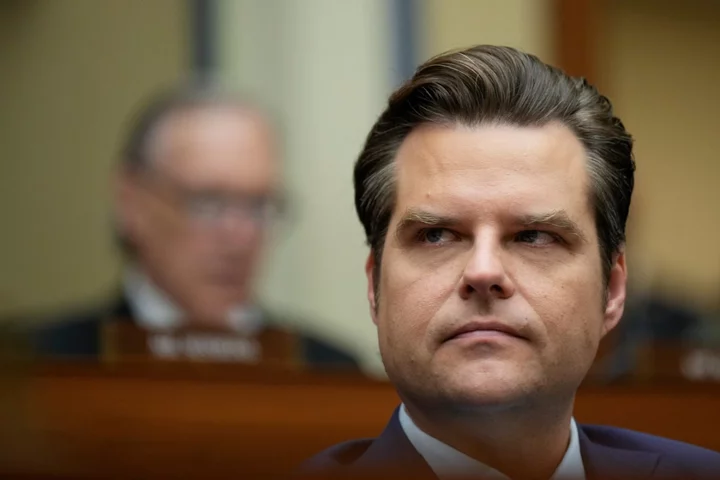
Matt Gaetz called a ‘murderer’ during an ‘all-time low’ anti-trans House committee hearing
As Republican-led states pass legislation to restrict or ban transgender youth from accessing gender-affirming healthcare, Republicans in Congress have held a series of hearings or steered discussion around implementing national bans while raising dubious claims and dismissing guidance from major medical groups. On 27 July, Democratic members of a Republican-led House committee condemned the latest “cynical and dangerous attack” on trans children and their families during one of the first congressional hearings against affirming care and health providers. The panel heard from a former college athlete who advocates against trans women and girls from participating in sports that match their gender, members of right-wing special interest groups that support legislation targeting LGBT+ people, and a person who formerly received affirming healthcare and now advocates against other receiving it. The committee also heard from a Texas mother whose 18-year-old son is transgender, as well as the trangender legal director of a prominent LGBT+ legal advocacy group. While Republican US Rep Matt Gaetz was railing against a law in Washington state that seeks to protect trans children estranged from their parents, a person watching the hearing from inside the chamber called the Florida congressman a “murderer”. “Oh please, get over yourself,” Mr Gaetz responded. Moments earlier, Republican US Rep Wesley Hunt used a poster of a food pyramid to compare children with gender dysphoria to children who want to eat ice cream for every meal. “What if we affirmed every thought our children had?” he said. Democratic US Rep Mary Gay Scanlon called the hearing a “cynical and dangerous attack on trans people and their families” motivated not by medical guidance but poll numbers, with Republican members “just repeating right-wing talking points to delegitimize” healthcare for trans youth, she said. “Today’s hearing is an all-time low for the Republican majority,” said Democratic US Rep Jerry Nadler. “In my three decades in Congress, I have taken part in plenty of hearings where I did not agree with the choice of topic, to say the least. I am absolutely disgusted at the Republican majority’s bullying, bigoted framing of an issue that would otherwise be worthy of serious discussion.” The New York congressman was furious, calling the hearing a “taxpayer-funded platform for congressional Republicans to bully transgender kids, who are already some of the most vulnerable members of our community”. “The last thing trans kids and their parents need in their lives is Republicans in Washington to jump on the anti-trans bandwagon just so they can fear monger for their five minutes of fame,” he added. The hearing – titled “Dangers and Due Process Violations of ‘Gender-Affirming Care’ for Children” – follows proposals from House lawmakers to strip support for affirming care for US military service members in a must-pass national defence bill, as well as a series of hearings and proposals that replicate the avalanche of legislation targeting trans people in nearly every state. By the end of May, state lawmakers had introduced more than 500 bills impacting LGBT+ people in 2023, including 220 bills specifically targeting trans and nonbinary Americans, according to an analysis from the Human Rights Campaign. Republican members of Congress have also introduced federal legislation that mirrors some of the proposals dominating state capitols. One measure would impose national restrictions on trans athletes, and another bill would impose a similar but more-expansive version of what critics have called state-level “Don’t Say Gay” bills used to restrict classroom discussion of LGBT+ people and events. Shannon Minter, legal director of the National Center for Lesbian Rights and the only trans person who addressed lawmakers, said in his opening statement that anti-trans legislation targets less than 1 per cent of the population as well as medication and supportive care regimens that have been widely available for decades. “They are not new. What is new is this recent massive overreach from state lawmakers,” he added. “These laws … they prevent doctors from doing their jobs, they prevent parents from getting medical care they need.” Stripping access to that care will have “devastating consequences for young people’s lives,” he said. “Decisions should be made by parents who love them, not by politicians who know nothing about a child’s life.” Miriam Reynolds, whose son Cameron is trans, shared the family’s journey to understanding what he was experiencing and working with health providers to “It was hard on me at first, but I was able to put my child’s needs before my feelings and find him the care he needed,” she said. “I could see that my child was happier and felt more and more comfortable the more he was affirmed.” There wasn’t any political “hysteria” surrounding his care when he came out several years ago, compared to the currently volatile environment surrounding his existence and the family’s support for him. “It’s absolutely heartbreaking,” she said. “To be looked at as a child abuser, or indoctrinator, or something like that, is extremely painful … It feels very hateful and divisive.” Mr Gaetz grilled Mr Minter about recently enacted Washington state law that allows shelters to first contact the state Department of Children, Youth and Families if trans children entering the facilities. “There’s no reason to treat these situations with transgender young people who may be in danger or at risk of abuse at home, any differently than we would treat any other child,” Mr Minter said. “I want authorities to treat these kids with the same care they treat all other children.” In his remarks, Mr Gaetz ironically defended the rights of “parents to parent” their children while dismissing families who have asked for the same right to support their trans children. “What’s terrible is when you have this incongruent desire of the government to restrain the abilities of parents to parent,” he said. Read More Ron DeSantis threatens legal action over Dylan Mulvaney’s Bud Light video How a Texas ban on gender-affirming care for trans youth could break healthcare for children across the state Trans youth and families condemn ‘heartbreaking’ Tennessee court ruling against gender-affirming care
2023-07-28 08:18
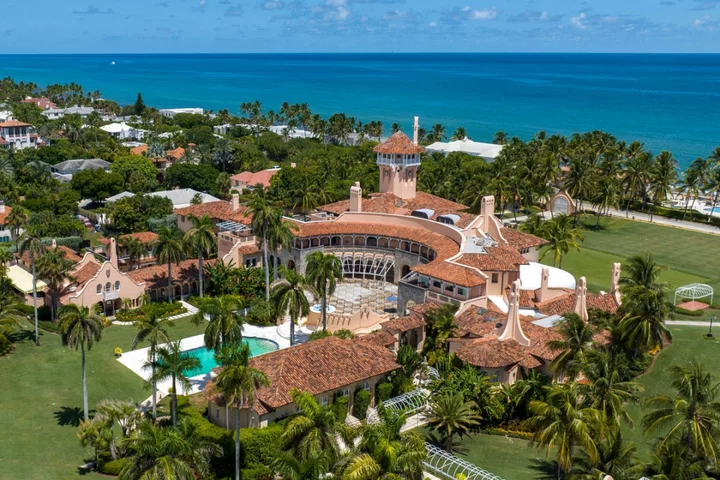
Trump hit with more charges as Mar-a-Lago worker added to documents case
Federal prosecutors have added more charges against former president Donald Trump for allegedly obstructing the investigation into whether he unlawfully retained national defence information at his Palm Beach, Florida property. In a superceding indictment filed late Thursday, prosecutors alleged that Mr Trump and co-defendant Walt Nauta conspired with another Mar-a-Lago worker, Carlos De Oliveira, to attempt to have surveillance footage from the club deleted so it could not be provided to the grand jury investigating the presence of classified documents at his property. Mr Trump was also newly charged with specifically posessing the classified document which he is alleged to have shown to a group of people at his Bedminster, New Jersey club. In a statement, Mr Trump’s presidential campaign called the new charges “nothing more than a continued desperate and flailing attempt by the Biden Crime Family and their Department of Justice to harass President Trump and those around him”. “Deranged Jack Smith knows that they have no case and is casting about for any way to salvage their illegal witch hunt and to get someone other than Donald Trump to run against Crooked Joe Biden,” the campaign said. In the superceding indictment, which was signed by Mr Smith personally, prosecutors allege that Mr Trump masterminded efforts to prevent the government from obtaining the footage it would later use to charge him with obstruction when he was first indicted on 8 June. According to the indictment, Mr Trump allegedly called Mr De Oliveira on 23 June of last year, one day after prosecutors emailed his company a draft grand jury subpoena calling for production of CCTV camera footage from the club, including locations where boxes containing classified documents were stored. It’s not known exactly what Mr Trump said to his new co-defendant during the 24 minute phone call, but prosecutors allege that at some point Mr Trump ordered the deletion of security camera footage so it could not be used to further the probe into his possession of documents with classification markings after the end of his presidency. The next day, prosecutors served the Trump Organisation with the final version of the subpoena, and Mr Trump is alleged to have met with Mr Nauta, who subsequently cancelled plans to travel with Mr Trump and instead arranged travel to Palm Beach. After the former US Navy Chief Petty Officer changed his plans, prosecutors allege that he lied to fellow employees and Secret Service agents about the purpose of his travel. At the same time, he contacted another Mar-a-Lago employee who served as director of information technology at the club, as well as another Mar-a-Lago worker, and disclosed to the latter that his purpose in visiting the club was to discuss how long CCTV footage was stored. Prosecutors also allege that Mr Nauta and Mr De Oliveira actually walked through the darkened club after Mr Nauta arrived there on 25 June, with flashlights to determine where different security cameras were located. Mr De Oliveira, who has also been charged with conspiracy and obstruction of justice, subsequently the aforementioned Mar-a-Lago employee that “the boss” wanted the footage deleted before it could be provided to the grand jury investigating the presence of classified documents at the club. The longtime Mar-a-Lago worker is also charged with lying to FBI agents about his role in assisting in the moving of boxes containing classified documents at different points during the investigation. Additionally, Mr Nauta has now been charged with conspiring with Mr De Oliveira to obstruct justice by participating in the efforts to have the surveillance at issue deleted, and Mr Trump has been hit with another count of obstruction of justice for asking for the footage to be deleted. Prosecutors have alleged that Mr Nauta contacted another Mar-a-Lago worker following the 8 August 2022 search of the club by FBI agents to tell them that “someone just to make sure Carlos is good”. The employee replied that Mr De Oliveira was loyal and would not do anything to harm his relationship with his employer, the ex-president. Mr Nauta also caused the employee to tell an employee of Mr Trump’s political action committee that Mr De Oliveira was loyal, and Mr Trump later personally called Mr De Oliveira to assure him that he would get him legal representation. Mr De Oliveira has been summoned to make his first court appearance in the case on 31 July at the same Miami courthouse where Mr Trump and Mr Nauta were arraigned. The new charges against Mr Trump and Mr Nauta and the charges against their new co-defendant come as Mr Smith and his colleagues are weighing whether to ask a Washington, DC grand jury to indict Mr Trump for crimes allegedly committed as he tried to overturn his 2020 election loss and remain in office against the will of voters. Last week, Mr Trump revealed that prosecutors had given his defence team a letter informing them that he is a target in the Justice Department probe into hiss to effort overturn the election and the January 6 attack on the US Capitol. The letter is understood to lay out three crimes which Mr Trump could be charged for: Conspiracy to defraud the United States, deprivation of rights under colour of law, and tampering with a witness. As grand jurors met at the Washington, DC federal courthouse on Thursday, Mr Trump’s legal team also met with prosecutors to try to dissuade them from seeking what would be the third indictment of Mr Trump since April. The ex-president later took to his bespoke social media platform in the early afternoon to confirm that his defence team had concluded what he described as a “productive meeting” with Department of Justice representatives, He also stated that his legal team spent the session “explaining in detail that [he] did nothing wrong, was advised by many lawyers, and that an Indictment of [him] would only further destroy our Country”. Grand jurors finished their work on Thursday without voting on any indictments, but they could be asked to return charges against Mr Trump when they reconvene on Tuesday. Read More Trump hit with new charges as aide is third person added to classified documents case Black lawmakers press Justice and Education Departments to investigate Florida's race curriculum Biden dispatches top adviser for talks with Saudi crown prince on normalizing relations with Israel Trump hit with new charges as aide is third person added to classified documents case Black lawmakers press Justice and Education Departments to investigate Florida's race curriculum Biden dispatches top adviser for talks with Saudi crown prince on normalizing relations with Israel
2023-07-28 07:22
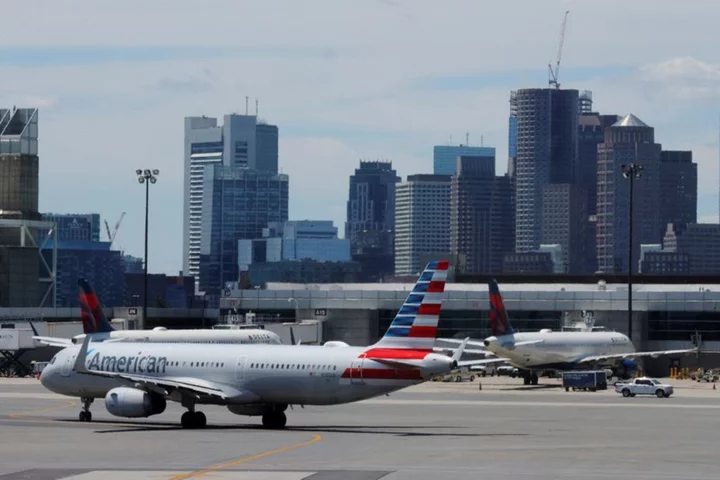
American Airlines pilots union says it has agreement on contract deal improvements
CHICAGO American Airlines' pilots union on Thursday said it has reached an agreement in principle with the company
2023-07-28 05:49
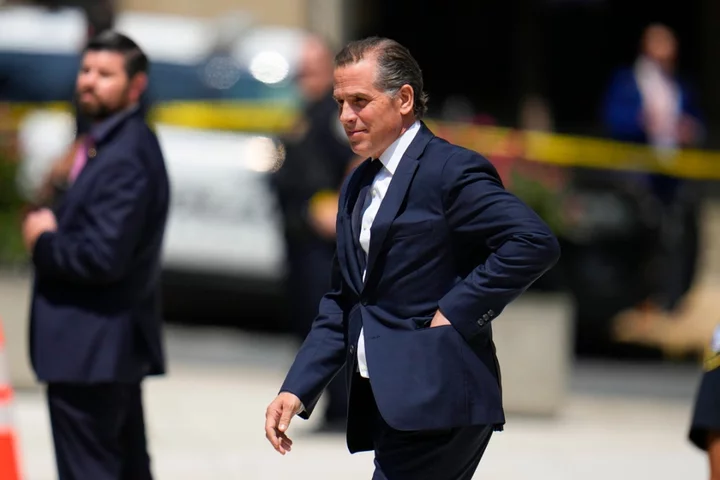
White House says Biden won’t pardon son for tax and firearms charges
The White House on Thursday said President Joe Biden would not use his authority as president to grant any pardons or other relief that would short-circuit the criminal case against his son, Hunter Biden. The younger Mr Biden, an attorney and lobbyist turned visual artist, is currently facing two misdemeanour charges for allegedly failing to pay taxes for two years, as well as a felony charge for allegedly lying on a gun background check form. During Thursday’s daily White House press briefing, press secretary Karine Jean-Pierre was asked if his father, the president, would consider pardoning his only surviving son. Ms Jean-Pierre replied: “No”. Federal prosecutors and attorneys for President Joe Biden’s son, Hunter Biden had previously settled on a deal for the lawyer and lobbyist turned artist to plead guilty to tax misdemeanour charges and enter into a diversion programme on a gun-related charge, but the judge overseeing the case demanded more information from both sides during a hearing at a Wilmington, Delaware courthouse on Wednesday. US District Judge Maryellen Noreika ordered attorneys from both sides to file briefs with the court on a provision of the diversion agreement which she had questioned because it raised separation of powers concerns, or modify the agreement to exclude the provision she questioned. The agreement, which she had reviewed, said that she would be responsible for deciding if Mr Biden was ever in breach of the agreement. She suggested that such a role would be improper for her because it is the executive branch, through prosecutors, which makes charging decision. Because Mr Biden had to enter a plea at his court appearance, he has pleaded not guilty while attorneys from both sides confer to make the agreement comply with the judge’s concerns. He will be able to enter a guilty plea when his attorneys and prosecutors have settled on language for a deal. Read More Trump slaps down reports of imminent Jan 6 grand jury indictment - live Sen Dianne Feinstein appears confused at meeting Deep dive into Meta's algorithms shows that America's political polarization has no easy fix
2023-07-28 03:24
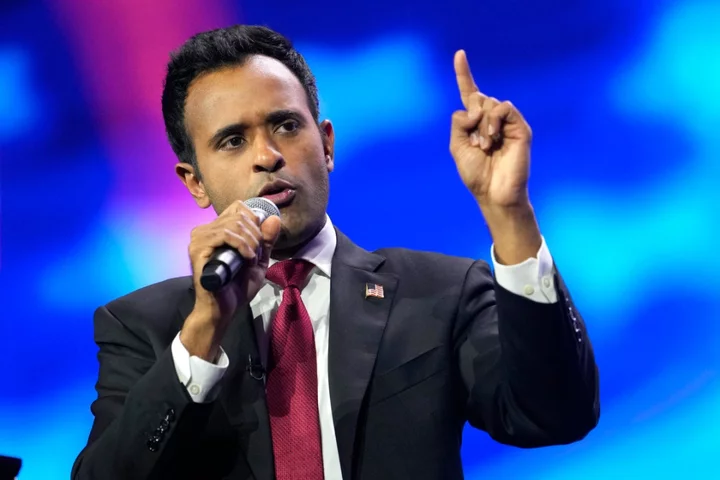
Viewers horrified as Vivek Ramaswamy tries to rap in Fox News interview
Republican 2024 presidential candidate and entrepreneur Vivek Ramaswamy concluded an interview on Fox & Friends by trying to rap. Host Steve Doocy said, “Someone has uncovered that in college … you were a libertarian rapper.” “Some of these opposition research stories are false, but I will confirm that one is true,” Mr Ramaswamy replied with a smile. “I was a little bit of a libertarian freestyler in college and had some fun with it.” “That’s kind of what I’m doing on the campaign trail: freestyling my message,” he added. Then the GOP candidate showed that the rumours were true, breaking into a freestyle on the air: “My name’s Vivek, it rhymes with ‘cake,’” he opened. “It is about thee, the United States is about lib-er-tee, so Fox & Friends join us on the trail, we’ll have some fun, I’ll see you at the trail.” Viewers quickly mocked Mr Ramaswamy’s rap abilities. One user on X, formerly known as Twitter, wrote: “One Watch 2024 Candidate Vivek ‘Da Vek’ Ramaswamy Freestyle Rap on Fox & Friends (He’s Not Great)” Another commented on the video: “*gag*” And yet another wrote: “Aaaaand that just ended his campaign lol” Someone even went so far as to say that Mr Ramaswamy “is just embarrassing at this point.” Read More Ramaswamy slated to headline South Carolina county GOP fundraiser in return to early voting state The presidential candidates who have so far met criteria to join first RNC debate GOP presidential hopeful Vivek Ramaswamy lists Senators Ted Cruz and Mike Lee as possible Supreme Court picks
2023-07-28 01:53

Several injured in stabbing outside Magnolia Bakery in New York’s West Village
A suspect is in custody after several people were injured in a stabbing near The Magnolia Bakery on Bleecker Street in Manhattan’s West Village, according to a report. A 911 call came in reporting an incident at W 11th St & Bleecker St, the Citizen website stated at 9.58am on Thursday morning. First responders arrived at the scene to attend to several stabbing victims with non-life-threatening injuries and officers called a Level 1 Mobilization and request for additional units as the search for the suspect expanded. Officers said that the suspect was a Black man wearing a gold chain and a navy blue shirt who fled the scene in the direction of an E train station, according to the site, which stated at 10.27am that officers reported having detained the suspect. The Independent has reached out to the NYPD for comment. Eli Klein, an art dealer and publisher according to his bio on X, the platform formerly known as Twitter, wrote shortly before 10am on Thursday that “Someone was just attacked in what looked like a stabbing a few feet away from me and my baby girl here in Manhattan’s West Village. NYC really needs to take broader steps to get violent criminals off of the streets”. “Looks like he just went on to stab more people, unless this is a different criminal, which wouldn’t surprise me. My description of the attacker I saw is: Black, male, 30s, 5’10, gray outfit,” he added in reference to the Citizen report. More follows...
2023-07-27 23:28
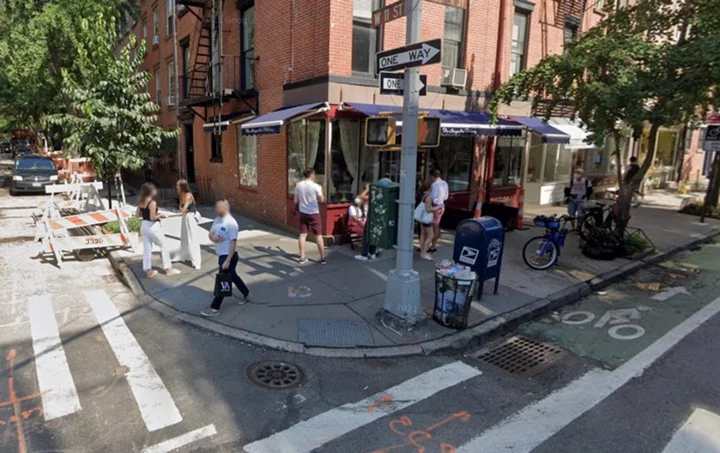
West Village stabbing - live: Multiple people injured in attack near NYC’s Magnolia Bakery
Multiple people have been injured in a stabbing in New York City’s West Village that took place on Thursday morning, reports say. Initial reports suggest that the incident occurred outside the famous Magnolia Bakery on the corner of W11th Street and Bleecker Street in the heart of the wealthy neighbourhood on the west side of Manhattan. It is not clear how many people have been injured in the stabbing, but their injuries are not believed to be life-threatening. Reports on the Citizen app indicate that police quickly apprehended a suspect shortly after releasing a brief description of him as an African American male in a navy shirt and gold chain. More follows...
2023-07-27 23:20
